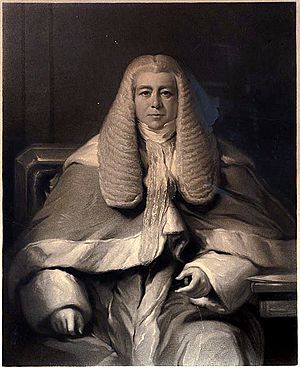Francis Blackburne facts for kids
Quick facts for kids
The Right Honourable
Francis Blackburne
|
|
|---|---|
 |
|
| Lord Chancellor of Ireland | |
| In office 1866–1867 |
|
| Preceded by | Maziere Brady |
| Succeeded by | Abraham Brewster |
| Personal details | |
| Born | 11 November 1782 Footstown Great |
| Died | 17 September 1867 (aged 84) Rathfarnham Castle |
| Alma mater | Trinity College Dublin |
Francis Blackburne was a very important Irish judge. He eventually became the Lord Chancellor of Ireland, which is the highest legal job in the country. He was born in 1782 and passed away in 1867.
Contents
Early Life and Education
Francis Blackburne was born in a place called Footstown Great in County Meath, Ireland. His father was Richard Blackburne. His family was well-known in the area.
He went to school in Dublin. Later, in 1798, he started studying at Trinity College Dublin. This is a very famous university. He was a brilliant student there. He won a scholarship and a gold medal in 1803. He graduated in 1806.
A Career in Law
Francis Blackburne became a lawyer in 1805. He quickly became very successful. People knew he was excellent at understanding all parts of the law. He was also very good at focusing his mind.
In 1822, he became a King's Counsel. This means he was a senior lawyer who advised the Crown. He helped bring order to the Limerick area for two years. In 1826, he became the King's Third Serjeant-at-law. By 1830, he was the Second Serjeant. These were important legal roles.
Becoming Attorney-General
In 1831, Francis Blackburne was chosen as the Attorney-General for Ireland. This job meant he was the chief legal advisor to the government. Even though he was a Tory (a political party), the Whig government appointed him. They wanted a wide range of political views in their team. When he got this job, he also joined the Privy Council of Ireland. This is a group of important advisors to the monarch.
He was the Attorney-General until 1834. He took the job again in 1841. After a year, he became the Master of the Rolls in Ireland. This role involved overseeing court records and some legal cases.
Important Trials and Challenges
As Attorney-General, Blackburne had disagreements with Daniel O'Connell. O'Connell was a famous Irish political leader. Blackburne insisted on appointing Abraham Brewster as a legal advisor. He said he "would not tolerate a refusal" to accept his choice. This shows how much power a strong Attorney-General had back then.
In 1845, Blackburne became the Chief Justice of the Court of Queen's Bench. This was another very high judicial position. He also prosecuted Daniel O'Connell in a famous trial. Later, he presided over the trial of William Smith O'Brien.
Lord Chancellor of Ireland
Francis Blackburne became the Lord Chancellor of Ireland in February 1852. This was the top legal job in Ireland. However, he was replaced in October of that year.
After a few years, he became the Lord Justice of Appeal in Chancery. In 1858, he was offered the Lord Chancellor job again. He first said no because of his age and health. But then he changed his mind. Unfortunately, the job had already been given to Joseph Napier. Blackburne was very disappointed by this. He called it "a harsh and cruel blow."
In 1866, he became Lord Chancellor for a second time. He held this position until he passed away the next year.
From 1851, he was also the Vice-Chancellor of the University of Dublin. He was a strong supporter of the Church of Ireland. He believed that protecting the Church also protected the Union of Great Britain and Ireland.
Family Life
In 1809, Francis Blackburne married Jane Martley. They had six sons and three daughters. Sadly, only five of their children lived longer than their father.
In 1852, Blackburne bought Rathfarnham Castle. This historic castle became his family home. His family continued to live there for three generations. His son, Edward Blackburne, inherited the castle after him.
 | Janet Taylor Pickett |
 | Synthia Saint James |
 | Howardena Pindell |
 | Faith Ringgold |

